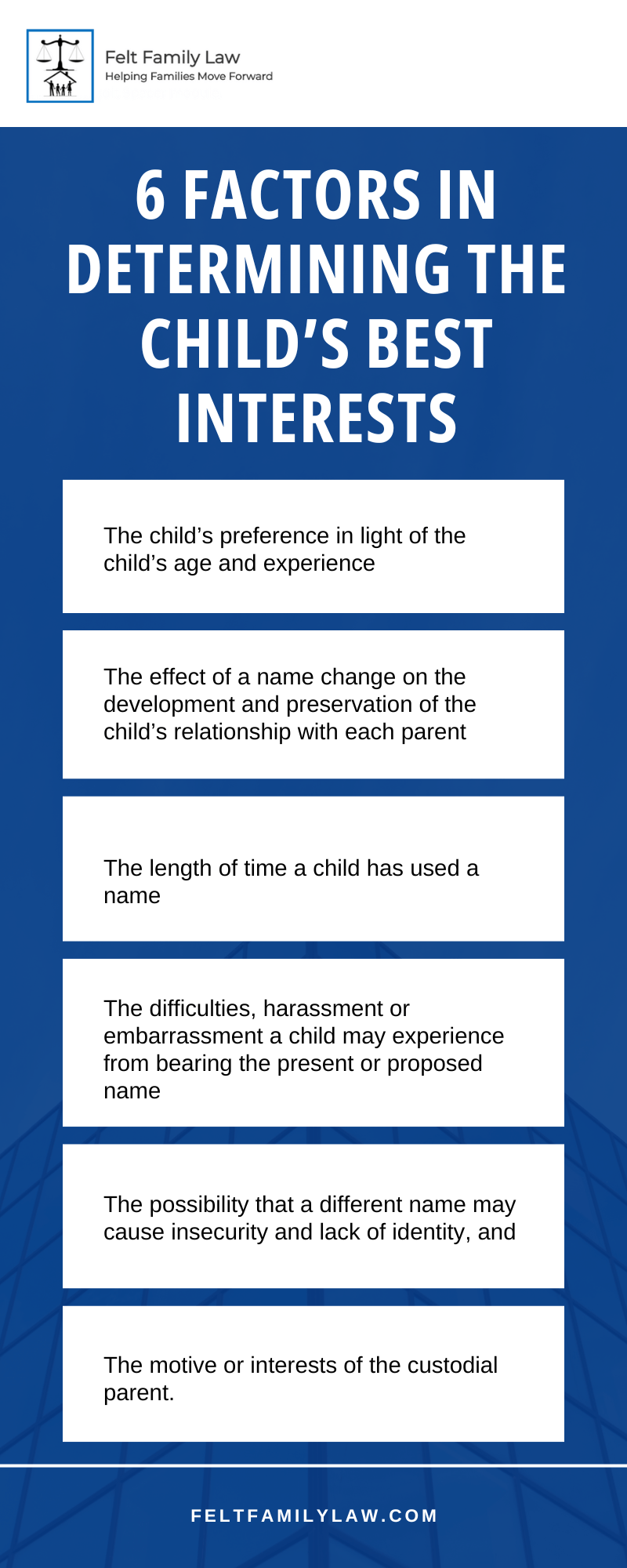 Social conventions concerning last names have changed significantly in the last century. Utah courts have used these changes to answer the issue of what a child’s surname should be, especially in divorce or child custody disputes. When parents fight over what a child’s last name should be, how do the courts decide?
Social conventions concerning last names have changed significantly in the last century. Utah courts have used these changes to answer the issue of what a child’s surname should be, especially in divorce or child custody disputes. When parents fight over what a child’s last name should be, how do the courts decide?
In the past, courts followed the idea that a child should carry their father’s surname. But the father or “family patriarch” is no longer seen as the automatic or only person able to legally represent family interests. Rules of inheritance, including inheritance of the “family name” have also changed much over time.
A more recent argument is that the child’s last name should be chosen exclusively by whichever parent gets custody of the children, because the custodial parent normally makes other significant life decisions for the children.
Utah courts firmly rejected both of these arguments in the 1980s, and instead adopted a more detailed “best interest of the child” test when parents argue in court over a child’s last name. This test for deciding in court for a child’s last name was spelled out in the case of Hamby v. Jacobson in 1989 by the Court of Appeals of Utah. The Hamby court applied six factors in determining the child’s best interests regarding the last name:
- The child’s preference in light of the child’s age and experience,
- The effect of a name change on the development and preservation of the child’s relationship with each parent,
- The length of time a child has used a name,
- The difficulties, harassment or embarrassment a child may experience from bearing the present or proposed name,
- The possibility that a different name may cause insecurity and lack of identity, and
- The motive or interests of the custodial parent.
Fist, when it comes to the child’s preference, there is no bright line regarding the child’s age and their ability to decide. In some cases, children aged seven and up were found mature enough to make decisions regarding their last name. In other cases, children as old as twelve are not deemed mature enough to have a say. In Utah, courts will generally listen to testimony from the child about their preference and take it into account, often through a Guardian ad Litem who meets with and speaks for the child, as long as the child is old enough to voice a preference.
Second, the effect of a name change on the development and preservation of the child’s relationship with each parent is a bit more complicated, because such effects are by nature purely speculative. A parent who wants to bolster their case should highlight each parent’s relationship with the child and show the potential positive and negative impacts a name change could have on the parent-child relationship. For example, in Velasquez v. Chavez (2019 UT App 185), the court found that a hyphenated surname would help the child understand the difference between his stepfather and his natural father as well as identify with each parent individually.
Third, the length of time a child has used a name refers to the length of time the child has used the surname in their community. In the case of Christensen v. Christensen (941 P.2d 622), for example, a mother and her child had just moved to Sandy, Utah. The child was using the mother’s last name of Brubaker, and the father contested the child should use the family name of Christensen. The court found that a name change to “Christensen” would not make much of a difference in the community since the mother and child had been in that community for such a short time. In other words, it would not take much for the community to adjust to the child using the father’s last name.
Fourth, regarding difficulties, harassment, or embarrassment a child may experience from bearing the present or proposed name, the court looks for evidence of difficulties, harassment or embarrassment as provided. For example, in the Hamby case, the mother did not want her children to bear their father’s name. Mother claimed that the children would suffer significant difficulties and embarrassment because of their father’s reputation as a drinker, fighter, and abuser. The court agreed with the evidence that father’s negative reputation would cause potential future difficulties or embarrassment for the children if they took on the father’s name.
Next, whether or not a different name may cause insecurity and lack of identity likewise depends on the specific facts of a case. For example, in the Hamby case, the mother offered testimony from the Education Coordinator of the Spafford School as well as a school psychologist that different surnames in a family can disrupt a child’s identity with themselves and the family, divide family unity, and adversely affect a child’s sense of security. The court agreed that it was in the children’s best interest for the two children to share the same last name.
Finally, the motives or interests of the custodial parent can be determined either by evidence offered as well as the court’s own observations. In the Christensen case, the court found that Ms. Brubaker’s motives for changing her child’s name were suspect, due to evidence from Ms. Brubaker’s prior court cases. In the prior cases, the court found Ms. Brubaker in contempt for deliberately interfering with Mr. Christensen’s relationship with his daughter. Ms. Brubaker had moved also repeatedly without informing Mr. Christensen, and she had even attempted to legally change her daughter’s name without informing the child’s father.
In custody and divorce cases, parents can change their child’s last name. When a child’s last name is contested, Utah courts will look to the child’s best interest in deciding whether or not the child’s name should be changed. Parents seeking to change a child’s last name in divorce or custody (and parents who oppose a name change) must be prepared to offer evidence about how the proposed name change will affect a child. The more evidence a parent offers to support or oppose the Hamby factors listed above, the more likely a court will rule in their favor.
If you are in a custody or divorce situation where the children’s last name is at stake, contact an attorney who specializes in family law and knows the Utah rules for changing or contesting changes to the children’s names, like Jonathan Felt at Felt Family Law & Mediation or another family law attorney near you.
Layton Child Custody Infographic

Mediation To Help With Changing A Child’s Surname
Our Utah divorce lawyer knows that disputes over changing a child’s name during a custody battle can be emotionally charged and challenging for parents. Below, you can find out more information on how parents can use mediation to come to an agreement.
How Can Mediation Help Parents Resolve Disputes About Changing A Child’s Name During A Custody Battle?
Mediation offers a collaborative and structured process for parents to address disagreements regarding a child’s name change in the context of a custody battle. A trained mediator facilitates constructive communication between parents, helping them explore underlying concerns, identify common ground, and work toward a mutually acceptable solution. Through mediation, parents can find a way forward that prioritizes the child’s best interests and preserves their relationship with both parents.
What Are The Benefits Of Using Mediation To Resolve Disputes About Changing A Child’s Name?
As our Utah divorce lawyer can attest, mediation offers several benefits over traditional litigation in resolving disputes about changing a child’s name during a custody battle. It provides a confidential and non-adversarial environment where parents can openly discuss their concerns and interests. Mediation empowers parents to maintain greater control over the outcome of their case, as they actively participate in crafting a solution that meets their family’s unique needs. Additionally, mediation is typically faster, less costly, and less contentious than going to court, allowing parents to minimize the emotional toll on themselves and their children.
What Issues Are Typically Addressed In Mediation When Disputing A Child’s Name Change During A Custody Battle?
In mediation, parents have the opportunity to address various issues related to changing a child’s name, including the reasons for the proposed name change, the significance of the child’s current name, and each parent’s concerns and preferences. Mediation also allows parents to explore potential compromises and creative solutions that take into account the child’s well-being and the co-parenting relationship. By addressing these issues collaboratively, parents can reach a resolution that reflects their shared commitment to their child’s welfare.
How Does Mediation Promote Cooperation And Co-parenting Success After Resolving Disputes About Changing A Child’s Name?
One of the key advantages of mediation is its focus on promoting cooperation and co-parenting success. By engaging in open and respectful dialogue during mediation, parents can improve their communication skills, build trust, and strengthen their co-parenting relationship. Mediation also provides a forum for parents to develop a parenting plan or agreement that outlines their roles and responsibilities regarding the child’s name and other important issues. By working together in mediation, parents can lay the foundation for effective co-parenting and collaboration in the future.
How Do I Get Started With Mediation To Resolve Disputes About Changing My Child’s Name During A Custody Battle?
If you’re facing a dispute about changing your child’s name during a custody battle, we encourage you to schedule a consultation with our experienced mediators. We’ll explain the mediation process, answer any questions you may have, and discuss your goals and concerns. Our mediators will work with you and the other parent to facilitate productive discussions and help you reach a resolution that prioritizes your child’s best interests. At Felt Family Law & Mediation, we’re committed to helping families find peaceful and constructive solutions to their disputes. Contact our Utah divorce lawyer today to schedule your consultation today.


